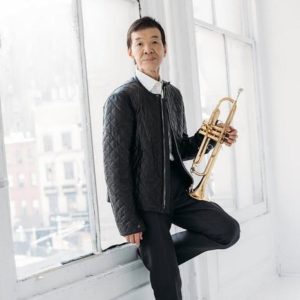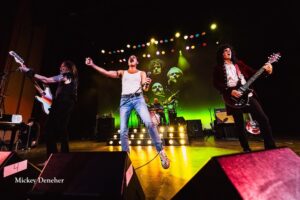 Considered one of the most influential trumpeters on the international music scene, Briarcliff Manor resident Shunzo Ohno is a Grammy Award-winning performer who has toured with such jazz legends as Gil Evans, Herbie Hancock, Wayne Shorter, Art Blakey, and many others. However, Ohno, 70, has had to overcome many obstacles on his road to success. Not only did he survive a severe car accident, but he also fought off stage-four lung cancer. All along the way he never gave up on his drive to play the trumpet and triumph over adversity.
Considered one of the most influential trumpeters on the international music scene, Briarcliff Manor resident Shunzo Ohno is a Grammy Award-winning performer who has toured with such jazz legends as Gil Evans, Herbie Hancock, Wayne Shorter, Art Blakey, and many others. However, Ohno, 70, has had to overcome many obstacles on his road to success. Not only did he survive a severe car accident, but he also fought off stage-four lung cancer. All along the way he never gave up on his drive to play the trumpet and triumph over adversity.
According to Ohno, “Years ago I wanted to sound like all the great jazz masters. I looked up to them and, even today, they sound fresh to me. But after the accident and cancer experiences, I recognized that I have my own unique identity.”
Ohno, who was born in Gifu Prefecture, Japan, fell in love with the trumpet at an early age. Even back then he had to overcome hardships to play his instrument. “Playing music was considered a luxury, especially when our family struggled to survive,” said Ohno. “I dragged my father to a store and showed him the trumpet hanging in the window and asked him if he would get it for me. He said, ‘No, we don’t have money for that kind of thing.’”
Ohno didn’t give up on his dream. In high school he was able to play the trumpet in the school band and then worked in music clubs at night and on the weekends. By the age of 19 he was Japan’s leading trumpeter.
Ohno’s career took off when he met Art Blakey, who invited him on a United States tour with his band, the Jazz Messengers. At Blakey’s suggestion, Ohno settled in New York City in 1974 to pursue his music career.
Along the way, Shunzo has had many mentors including the celebrated jazz master Machito. In fact, the compelling Latin energy in Ohno’s playing can be traced back to his tenure with Machito and his Afro-Cuban Orchestra. It was with Machito that Shunzo recorded the Grammy Award winning album “Machito and his Salsa Big Band” in 1982.
“Machito was extremely caring. I witnessed his sense of dignity and grace everywhere he went,” said Ohno. “Fame was not important to him. Music was his life and he shared a distinct humble grandness.”
Among his other mentors was Gil Evans, who Ohno considers a master arranger and composer. Shunzo joined forces with Evans after his work with Machito and became a key contributor on the musician’s tours, club dates, and recordings, including the 1988 Grammy Award-winning “Live at Sweet Basil.”
Shunzo Ohno will be playing locally at the Jazz Forum in Tarrytown on Sunday December 8, at 4 and 6 pm. He will be joined by musicians Ira Coleman, Jerome Jennings, and David Berkman, along with members of the Lotus Chamber Music Collective. (Ohno’s daughter Sasha is a member of the Collective and will be performing on the cello that evening.)
It was in 1988 that Ohno had his terrible car accident. “I was thrown from the car and had a concussion and multiple wounds. But, most critical for me was that my lips were deeply cut and my front teeth were broken, “ said Ohno.
“A trumpeter needs a perfect embouchure to play his instrument. This involves facial muscles, tendons, teeth, and lips needed to form the correct positions to produce sound from the trumpet. Now my embouchure is created with these handicaps,” he said.
Not letting the accident stop him from performing, Ohno came back to music three months later to record the acclaimed album “Something More,” with jazz greats Buster Williams, Herbie Hancock, Wayne Shorter, and Al Foster.
Adversity struck Ohno again in 1996 when he was diagnosed with life threatening throat cancer. He underwent radical treatments for three years to control the disease. All along, he never gave up hope about returning to his beloved trumpet.
Ever the fighter, Ohno beat the disease and continues to play his trumpet and compose music. He has 16 recordings under his name as a leader and has appeared on over thirty more as a sideman. Among his many honors, Ohno won the International Songwriting Competition’s grand prize in 2014 with this composition “Musashi”, making Ohno the first jazz recipient of this prestigious award.
While continuing to tour in America and Asia, Ohno is also committed to supporting those who are in need. Following the earthquake that struck Northern Japan in 2011, Ohno has made it his mission to revive music programs and provide instruments and instruction to students in the affected areas.
“The children I visited asked me to never forget them, and I made a promise to them. I coordinated music lessons for the middle school children. They had lost family members, neighbors, friends and schools; their entire community vanished,” said Ohno. “We found ways to get instruments and found a teacher who traveled once a week to teach band.”
After a year, Ohno encouraged them to participate in a school band competition. Neither the students nor their teachers felt it was possible, but they ended up winning the gold prize.
Ohno relates to the students and they have touched him deeply. “Because I understand recovery, I know how difficult it is to have courage, hope, and dream big when everything is lost. This is what I can share in my music, “ said Ohno.
More information is available at shunzoohno.com.







This is a beautiful and powerful story, a tribute to Mr. Shunzo Ohno. Mr. Ohno’s story demonstrates not only the power of the human spirit to survive, and even thrive, in the face of adversity, but it also a demonstrates the power of art to restore and rehabilitate the human spirit, to birth hope at times of hopelessness.